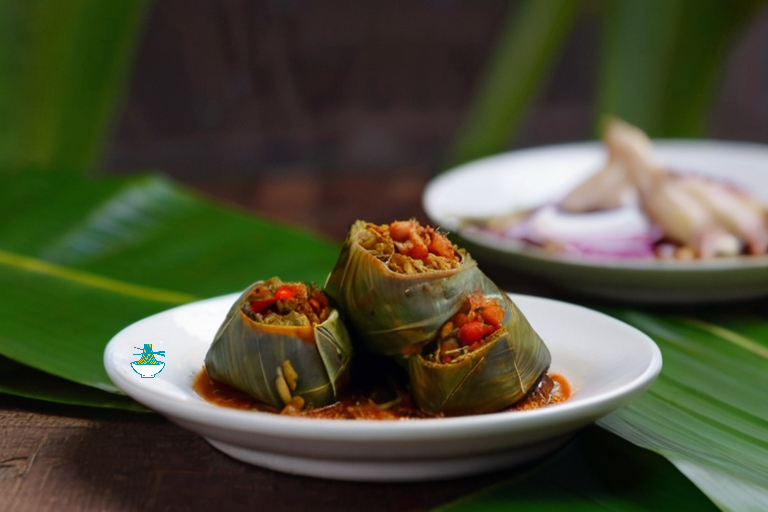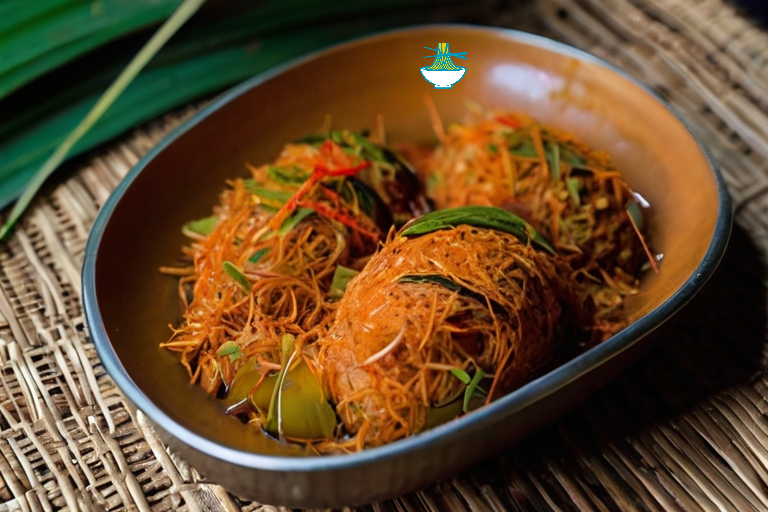Step into the vibrant culinary world of West Africa with the tantalizing flavors of Cameroon's Ekwang. A traditional dish deeply rooted in Cameroonian culture, Ekwang showcases the rich diversity of ingredients and cooking techniques that define African cuisine. This delectable dish combines the earthy sweetness of cocoyam with succulent pieces of meat or fish, all enveloped in a luscious palm nut sauce, creating a symphony of flavors that will transport your taste buds to the heart of Africa. Join us on a culinary journey as we uncover the secrets behind preparing this beloved Cameroonian delicacy.
Ingredients:
- 1 kg cocoyam
- 500g meat or fish (chicken, beef, or fish fillets are commonly used)
- 1 cup palm oil
- 1 large onion, finely chopped
- 2-3 cloves of garlic, minced
- 2-3 tomatoes, chopped
- 1 tablespoon ground crayfish (optional)
- 1 tablespoon ground dried shrimp (optional)
- 1-2 Scotch bonnet peppers, finely chopped (adjust to taste)
- Salt to taste
- Banana leaves or aluminum foil (for wrapping)

Instructions:
Prepare the Cocoyam:
1- Peel the cocoyam and grate it finely using a grater or food processor.
2- Rinse the grated cocoyam in cold water to remove excess starch. Squeeze out any excess water and set aside.
Prepare the Meat or Fish:
1- If using meat, cut it into bite-sized pieces. If using fish, clean and cut it into chunks.
2- Season the meat or fish with salt and any desired spices, such as black pepper or seasoning cubes.
3- In a skillet, heat a tablespoon of palm oil over medium heat. Add the chopped onions and garlic, and sauté until fragrant.
4- Add the seasoned meat or fish to the skillet and cook until browned. If using fish, be gentle when flipping to prevent it from breaking apart. Set aside.
Prepare the Palm Nut Sauce:
1- In a separate pot, heat the remaining palm oil over medium heat.
2- Add the chopped tomatoes and Scotch bonnet peppers, and cook until softened.
3- Stir in the ground crayfish and dried shrimp (if using), and cook for an additional 2-3 minutes.
4- Add the cooked meat or fish to the pot, and season with salt to taste. Allow the flavors to meld together for a few minutes. Remove from heat and set aside.
Assemble and Wrap the Ekwang:
1- Take a large banana leaf or a piece of aluminum foil and place a portion of the grated cocoyam in the center.
2- Spoon some of the palm nut sauce mixture over the cocoyam.
3- Fold the banana leaf or foil over the filling, creating a neat parcel. Secure the edges tightly to prevent any leakage.
4- Repeat the process with the remaining cocoyam and palm nut sauce mixture.
Steam the Ekwang:
1- Place the wrapped parcels in a large steamer basket or pot.
2- Steam the Ekwang over medium heat for about 45 minutes to 1 hour, or until the cocoyam is tender and cooked through.
3- Carefully remove the parcels from the steamer and allow them to cool slightly before serving.
Serve and Enjoy:
1- Unwrap the Ekwang parcels and serve hot.
2- Enjoy this delicious Cameroonian delicacy with your favorite side dishes, such as fried plantains, steamed rice, or boiled yams.
3- Share with family and friends and savor the authentic flavors of Cameroon's Ekwang!
Nutritional Values:
Here's an approximation of the nutritional values for the ingredients used in the Cameroon Ekwang recipe:
Cocoyam (1 kg):
- Calories: 600 kcal
- Carbohydrates: 140 g
- Protein: 8 g
- Fat: 1 g
- Fiber: 16 g
benefits:
- Rich in carbohydrates, providing energy for the body.
- High in fiber, promoting digestive health and aiding in weight management.
Meat or Fish (500 g):
- The nutritional values can vary depending on the type of meat or fish used. Here's an approximate value for chicken breast:
- Calories: 770 kcal
- Protein: 92 g
- Fat: 43 g
- Carbohydrates: 0 g
- Fiber: 0 g
benefits:
- Excellent source of protein, essential for muscle growth, repair, and overall body function.
- Contains essential vitamins and minerals such as iron, zinc, and vitamin B12, important for various bodily processes.
Palm Oil (1 cup):
- Calories: 1928 kcal
- Fat: 218 g
- Carbohydrates: 0 g
- Protein: 0 g
benefits:
- Contains healthy fats, including monounsaturated and saturated fats, which provide energy and support cell function.
- Contains antioxidants such as vitamin E, which help protect cells from damage caused by free radicals.
Onion (1 large):
- Calories: 44 kcal
- Carbohydrates: 10 g
- Protein: 1 g
- Fat: 0 g
- Fiber: 2 g
benefits:
- Rich in antioxidants, particularly quercetin, which may have anti-inflammatory and anti-cancer properties.
- Contains prebiotic fibers that support gut health and may improve digestion.
Garlic (2-3 cloves):
- Calories: 4-6 kcal
- Carbohydrates: 1-2 g
- Protein: 0-1 g
- Fat: 0 g
- Fiber: 0 g
benefits:
- Has antibacterial and antiviral properties, which may help boost the immune system and fight infections.
- Contains sulfur compounds like allicin, which may help lower blood pressure and cholesterol levels.
Tomatoes (2-3):
- Calories: 50-75 kcal
- Carbohydrates: 10-15 g
- Protein: 2-3 g
- Fat: 0-1 g
- Fiber: 3-5 g
benefits:
- High in vitamin C and other antioxidants, which support immune function and protect against cellular damage.
- Rich in lycopene, a powerful antioxidant associated with a reduced risk of certain cancers and heart disease.
Ground Crayfish (1 tablespoon):
- Calories: 16 kcal
- Protein: 2 g
- Fat: 1 g
- Carbohydrates: 0 g
- Fiber: 0 g
benefits:
- Good source of protein and essential amino acids, necessary for muscle repair and growth.
- Contains omega-3 fatty acids, which support heart health and may reduce inflammation.
Ground Dried Shrimp (1 tablespoon):
- Calories: 20 kcal
- Protein: 3 g
- Fat: 0.5 g
- Carbohydrates: 0 g
- Fiber: 0 g
benefits:
- Provides protein and essential amino acids necessary for various bodily functions.
- Contains minerals such as selenium and iodine, important for thyroid health and immune function.
Scotch Bonnet Peppers (1-2):
- Calories: 10-20 kcal
- Carbohydrates: 2-4 g
- Protein: 0-1 g
- Fat: 0-1 g
- Fiber: 1-2 g
benefits:
- Rich in capsaicin, which has been shown to have anti-inflammatory and pain-relieving properties.
- Contains vitamin C and other antioxidants, which support immune function and may reduce the risk of chronic diseases.
Salt (to taste):
- Nutritional value of salt is negligible.
Nutritional values are approximate and can vary based on factors such as cooking methods and specific ingredient brands. It's always advisable to consult a nutritionist for precise dietary information.


Comments